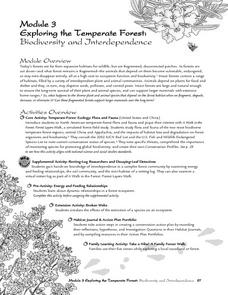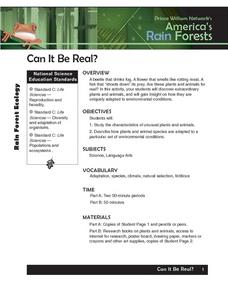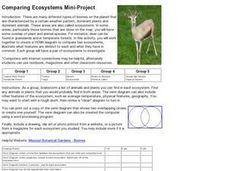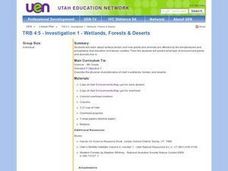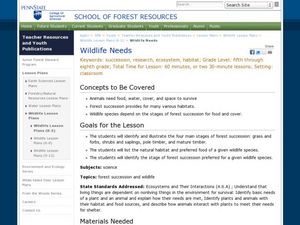American Museum of Natural History
Bio-Benefits
Kick-start a discussion of the importance of biodiversity with a colorful resource that touts the benefits of maintaining healthy ecosystems. The images stress the interdependence of all the elements of an ecosystem.
American Museum of Natural History
Cuban Wildlife Matching Game
Young biologists match Cuban wildlife to their ecosystems by dragging images of the creatures to either a forest, coral reef, cave, or wetland habitat.
Curated OER
Go To Sleep, Gecko!
Second graders examine the interdependence of organisms using the book "Go To Sleep, Gecko!" They examine a variety of food chains, listen to the book, and answer story comprehension questions. Students then conduct research on food...
National Park Service
The Secret of Life
Dead trees provide nutrients for the soil, food for animals, protection and a home for organisms, a seed-bed for new trees, and a place for nitrogen-fixing bacteria to live. In the activity, pupils collect decaying logs, expose them to a...
Curated OER
Forest Decomposition
Students explore decomposition. Students define and describe components of the decomposition process. Students make a composter in a terrarium. Students record observations and changes weekly, drawing conclusions about the results...
Curated OER
Exploring the Temperate Forest: Biodiversity and Interdependence
Students examine the consequences of cutting down large amounts of forests throughout the world. In groups, they use the internet to complete a module taking them on a tour through different temperate forests. To end the lesson, they...
Curated OER
America's Rain Forests Can It Be Real?
Learners examine the attributes of unusual plants and animals before determining how they are adapted to specific habitat. They complete an associated worksheet. They make posters with information that they find during research sessions.
Curated OER
Diversity Ecosystems
Students work in teams to characterize their biomes and compare them to the biomes of the rest of the class. In this biomes lesson plan, students complete a bean activity, relate it to the diversity in biomes, and then research and...
Curated OER
Comparing Ecosystems
Students, in groups, research two biomes. They create a Venn diagram and include the characteristics of each biome, placing similar features in the overlapping area of the circles.
Curated OER
Rain Forest Animals
Students create a book about animal species found only in the Amazon rain forest. They find one species to represent each letter of the alphabet, and write each name on a different piece of paper. They illustrate each page with an...
Curated OER
Investigation 1 - Wetlands, Forests & Deserts
Fourth graders examine surface terrain and how plants and animals are affected by the temperatures and precipitation that elevation and terrain creates. Then students predict what type of environment plants and animals live in.
Curated OER
For Creative Minds: Mountain Ecosystems
In this mountain ecosystems worksheet, students read information about mountain ecosystems and study various diagrams about the environment. Students match animals in the ecosystem to their descriptions.
Curated OER
Ecosystems Online
Students work together to gather information on ecosystems from websites. They identify plants and animals and create their own website. They are graded on their willingness to work together and the content on the website.
Howard Hughes Medical Institute
Modeling Trophic Cascades
In the ecological game of who eats who, one small change can have a big impact! Individuals create food chains in an array of ecosystems, then determine what happens to organisms in the chain when one organism changes its feeding...
Curated OER
Biomes and Plant Growth
Seventh graders design four biomes models and plant three types of seeds in them to observe growth. In groups for each type of biome, they predict the seeds' growth in each of the settings. Students follow the conditions on a biome chart...
Curated OER
Visual Vocabulary
Students interpret and name the vocabulary termed acted out by the mime. In this science/language arts/physical education lesson, students are given a set of vocabulary terms to discuss within their group. Next, students place all...
Curated OER
Wildlife Needs
Students identify the wildlife needs in a specific setting. In this wildlife needs lesson, students identify and illustrate the four stages of forest succession. Students list the natural habitat and food for a given species. Students...
Curated OER
Gwynns Falls
Students investigate the question: What is the impact of urban development and expansion on the health of a decidious forest ecosystem and humans? They examine the issue of land development by responding to a specific scenario and...
WolfQuest
The Return of Gray Wolves to Yellowstone National Park: Right or Wrong?
Should gray wolves be removed from Yellowstone National Park? After researching the complex relationships between the various habitats and species at Yellowstone National Park, including humans, class members take a position...
Curated OER
Connections
Students examine the interdependence of the West Central African forest ecosystem. They draw pictures of items found in this ecosystem, discuss their interdependence, and answer discussion questions.
Curated OER
Beaver Ecology
Students explore the lives of bgeahvers. They identify the physical and behavioral adaptations that help beavers survive in their environment. Students compare and contrast how beavers influence the ecology of both forest and aquatic...
Curated OER
Biodiversity
Students complete activities to study the importance of biodiversity. In this biodiversity lesson, students find images to categorize into organism groups and illustrate their interconnections. Students use measurement tools to study a...
Curated OER
Habitat, What is That?
Students explore animal habitats. In this environmental stewardship instructional activity, students match animals to their habitats in a classroom activity. Students also observe a firefly habitat and read Fireflies. Students create...
Curated OER
Which One Matters?
Learners study the balance necessary to maintain ecosystems and how changing that balance can impact the ecosystem. They identify and discuss the need for balance in any ecosystem and discuss how greenhouse gases impact ecosystems.





